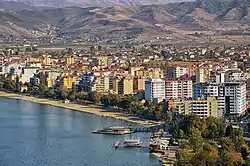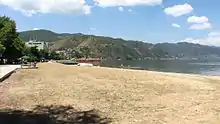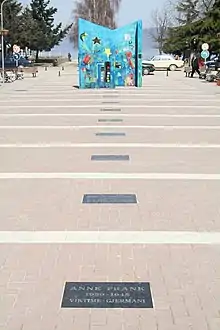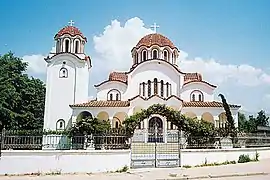Pogradec
Pogradec (Albanian pronunciation: [pɔɡɾaˈdɛt͡s]) is the eleventh most populous city of the Republic of Albania and the capital of the eponymous municipality. It is located on a narrow plain between two mountain chains along the southwestern banks of the Lake of Ohrid. Its climate is profoundly influenced by a seasonal Mediterranean and Continental climate.
Pogradec | |
|---|---|
 View of Pogradec | |
 Seal | |
 Pogradec  Pogradec | |
| Coordinates: 40°54′N 20°39′E | |
| Country | Albania |
| Region | Southern Albania |
| County | Korçë |
| Municipality | Pogradec |
| Government | |
| • Mayor | Ilir Xhakolli[1] (Socialist Party) |
| Area | |
| • Municipality | 584.77 km2 (225.78 sq mi) |
| Elevation | 735 m (2,411 ft) |
| Population (2011)[3] | |
| • Municipality | 61,530 |
| • Unit | 20,848 |
| Demonym(s) | Pogradecare (f) Pogradecar (m) |
| Time zone | UTC+1 (CET) |
| • Summer (DST) | UTC+2 (CEST) |
| Postal code | 7301–7303 |
| Area code(s) | +355 (0)83 |
| Vehicle registration | PG |
| Website | bashkiapogradec.al |
Pogradec and its surroundings were listed by UNESCO as a World Heritage Site as part of the natural and cultural heritage of the region of Ohrid.[4] Nevertheless, the Illyrian Royal Tombs in the adjacent unit of Proptisht are on the Albanian tentative list for becoming a World Heritage Site.[5]
Etymology
The name of the town is Eastern South Slavic in origin. Pogradec comes from Po(d) (under/beneath) and Gradec (town, city, castle or fortified settlement) and means literally "under the city". This is a reference to the ancient Illyrian settlement, which was situated on a hill above the contemporary region of Pogradec. In the medieval period during the Ottoman occupation, the town was known as İstarova or İstarye during Ottoman rule and was bounded to as kaza center in Görice Sanjak of Manastır Vilayet before Balkan Wars.[6][7]
History

From the 8th until the 14th century, Pogradec area was captured by various medieval states such as the Bulgarian, Byzantine and Serbian Empires as well as by noble Albanian families such as Gropa. In the middle of 15th century the area became part of Skanderbeg state and after his death in 1468, it was invaded by the Ottomans who kept it until Albania's Independence in 1912. During their occupation Pogradec was the center of the kaza of Starova and was developed as a small town of craftsmen and fishermen. When the Turkish traveler Evliya Celebi visited the area in 1662 he wrote that "Pogradec was a sweet city with red roofs, four neighborhoods, four mosques, two elementary schools, six hundred houses and one hundred and fifty shops".
During the second half of the 19th century and beginning of the 20th century, Pogradec area played an important role in the Albanian National Renaissance. In 14 March 1887 the second Albanian language school was started here.

During WWI Pogradec became a battlefield divided between the enemy fronts. From 1914 until 1920 Austro-Hungarian, Serbian, Greek, Bulgarian and French armies, captured the city replacing each-other from time to time.
During WWII the city was first invaded by the Italian army in 12 April 1939. Italian occupation of Pogradec was interrupted due to Greco-Italian War and Greek troops occupied the city between 30 November 1940 and 14 April 1941. After Italy's capitulation in 1943 the Italians were replaced by the German Nazis who kept the city until 30 August 1944 when it was liberated by the Albanian partizans.
After the war the town was a favorite summer escape for many communist government officials and particularly Enver Hoxha. The summer residences and the area around them were sealed off from the public.
Geography
Pogradec lies mostly between latitudes 40° and 54° N and longitudes 20° and 39° E. It is located on the shore of the southwestern corner of the Lake of Ohrid between two mountain chains located in the north and east.[8] The mountain chain of Mali i Thatë in the Prespa National Park rises in the east of the city and divides the region from the Lake of Prespa.[8] Defined in an area of 584.77 km2 (226 sq mi), the municipality of Pogradec is encompassed in the county of Korçë within the Southern Region of Albania and consists of the adjacent administrative units of Buçimas, Çërravë, Dardhas, Proptisht, Trebinjë, Udenisht, Velçan and Pogradec as its seat.[2][9][10]
Climate
The climate of the Lake Ohrid is classified as a local-continental type because of a microclime that is created in that area influenced by Mediterranean climate. The average annual rainfall in the Lake basin amount to approximately 730 mm.
| Climate data for Pogradec | |||||||||||||
|---|---|---|---|---|---|---|---|---|---|---|---|---|---|
| Month | Jan | Feb | Mar | Apr | May | Jun | Jul | Aug | Sep | Oct | Nov | Dec | Year |
| Average high °C (°F) | 3 (37) |
8 (46) |
13 (55) |
17 (63) |
22 (72) |
27 (81) |
30 (86) |
30 (86) |
25 (77) |
19 (66) |
12 (54) |
5 (41) |
18 (64) |
| Average low °C (°F) | −5 (23) |
−3 (27) |
1 (34) |
5 (41) |
9 (48) |
12 (54) |
14 (57) |
14 (57) |
10 (50) |
7 (45) |
2 (36) |
−2 (28) |
5 (42) |
| Average precipitation mm (inches) | 40.5 (1.59) |
38 (1.5) |
34.9 (1.37) |
53.1 (2.09) |
48.4 (1.91) |
29.2 (1.15) |
30.8 (1.21) |
29.2 (1.15) |
38.7 (1.52) |
53.4 (2.10) |
65.6 (2.58) |
73.5 (2.89) |
535.3 (21.06) |
| Average precipitation days (≥ 1 mm) | 8 | 8 | 8 | 12 | 10 | 7 | 6 | 4 | 7 | 9 | 11 | 13 | 103 |
| Source: World Weather Online[11] | |||||||||||||
Economy
Pogradec is located about 139 km from Tirana, the capital city of Albania, 40 km from Korça, and 5 km from North Macedonia. Pogradec is the last railway station: Tirana - Durrës - Elbasan - Librazhd - Pogradec and located along SH3 road that passes through Devoll and continues to Greece. Translake transport started on 15 June 2014 with a tourist ferry between Pogradec and Ohrid, but the service is sporadic and unreliable.
Culture


Pogradec is well known for its famous writers and poets such as Lasgush Poradeci and Mitrush Kuteli, and lately Luan Starova. Their works are a crucial part of Albanian literature.
The main characters of Luan Starova's cycle of novels, "The Balkan Saga", are the author's own parents and their family, who fled Pogradec for Macedonia during World War II. Separated from their old hometown and their relatives by the Albania-Yugoslavia border during the Enver Hoxha's era, they would often look at Pogradec through a binocular from the vantage point of Monastery of Saint Naum on the other side of the lake.[12]
Pogradec is also the home of nationally acclaimed painters like Anastas Kostandini(Taso), Gjergji Lako, Gentian Zeka, Vangjo Vasili and Ilir Dhima. All kinds of sports are practiced in town, especially by the youth.
Pogradec has a professional soccer team (currently in the Superliga, the best division in Albania) which holds the name Pogradeci. There are several varsity soccer teams mainly composed of high school students. Even volleyball and basketball are played competitively. During the summer, beach volleyball draws the attention of all the residents. Many professional volleyball teams from Albania and other Balkanic countries participate in a championship which lasts about two weeks. Pogradeci team has been awarded the first prize several times. Other sports to mention are swimming and boxing. The boxing team, "Dragoi", is one of the top teams in the nation and has always trained champions.
Pogradec also has a rich folklore. Many songs and dances have been created throughout the centuries. Their themes are based on the beauty of the lake and a love for nature.
Some of the main recurring cultural events in the city are:
"Puppet Theater Festival" - Takes place every June. Participants vary from national to European level.
"Lake Day" - Takes place in 21 June. All the towns surrounding lake Ohrid (Pogradec, Ohrid and Struga) gather in a festival where local delicacies, including food and culture are showcased.
"Balkan Film Food Festival" - Takes place in September. Balkan movies, documentaries and culinary are showcased throughout the days of the festival.
"Wine Fest" - Takes place in December. Pogradec families compete together for the best homemade wine in the city. The days of the festival are accompanied by great food and live music.
.jpg.webp)


Pogradec area is very rich in cultural and natural monuments among which can be mentioned
- Pogradec Castle
- 19th and 20th century historical center of the city of Pogradec
- Castle of Blace village
- Castle of Zemçë village
- Fortifications in the village of Slabinjë
- Prehistoric settlement of Zagradie in the village of Lin
- Bridge near the villages Jollë and Llëngë
- Bridge near the village of Golik
- Bridge near the village of Niçë
- Bridge near the village of Çezmë
- Bridge in the village of Zgallë
- Bridge in the village of Servatinë
- Terziu Bridge in the village of Proptisht
- Fortification in the village of Shpellë in Mokra
- St. Marina's Monastery in the village of Llëngë
- Paleo-Christian church and mosaics in the village of Lin
- Byzantine church in the village of Lin
- Mosaic in the village of Tushemisht
- Drilon water sources and swans park near Tushemisht
- Guri i Kamjes in Mokra
- The karstic cave and small lake inside it above the village of Hudenisht
References
- "Drejtuesit e Bashkise–Kryetari Bashkise" (in Albanian). Bashkia Pogradec. Archived from the original on 10 October 2020. Retrieved 10 October 2020.
- "Bashkia Pogradec". Albanian Association of Municipalities (AAM). Archived from the original on 10 October 2020. Retrieved 10 October 2020.
- "Censusi i popullsisë dhe banesave/ Population and Housing Census–Korçë 2011" (PDF) (in Albanian). Tirana: Instituti i Statistikës (INSTAT). p. 86. Archived from the original (PDF) on 27 March 2020. Retrieved 10 October 2020.
- "Natural and Cultural Heritage of the Ohrid region". United Nations Educational, Scientific and Cultural Organization (UNESCO). Archived from the original on 10 October 2020. Retrieved 10 October 2020.
- "Les tombes de la Basse Selca" (in French). United Nations Educational, Scientific and Cultural Organization (UNESCO). Archived from the original on 10 October 2020. Retrieved 10 October 2020.
- "Osmanli Tatarân Teşkilât'i (in Turkish)" (PDF). Archived from the original (PDF) on 2012-03-24. Retrieved 2011-05-23.
- Osman Vilayets (in Turkish)
- Pillati, Arjola (15 January 2013). "E ardhmja e turizmit në qytetin e Pogradecit" (PDF) (in Albanian). Aleksandër Moisiu University. Archived from the original (PDF) on 10 October 2020. Retrieved 10 October 2020.
- "A new Urban–Rural Classification of Albanian Population" (PDF). Instituti i Statistikës (INSTAT). May 2014. p. 15. Archived from the original (PDF) on 14 November 2019. Retrieved 10 October 2020.
- "Law nr. 115/2014" (PDF) (in Albanian). Fletorja Zyrtare e Republikës së Shqipërisë. p. 96–97. Archived from the original (PDF) on 24 September 2015. Retrieved 10 October 2020.
- World Weather Online
- The theme repeats e.g. throughout The Museum of Atheism
External links
- bashkiapogradec.gov.al – Official Website (in Albanian)


